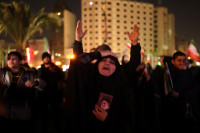World
US Senate votes Alice Albright as the next CEO of MCC
The American agency has been the centre of attention in Nepal with the $500 million grant compact running into controversy.
Post Report
Alice Albright has been confirmed as the chief executive officer of the Millennium Challenge Corporation.
“The US Senate voted unanimously today to confirm Alice Albright as the next CEO of the Millennium Challenge Corporation,” MCC said on February 7 in a press release.
“Congratulations to Alice on this momentous achievement,” said MCC’s acting CEO Mahmoud Bah, according to the statement. “We are all very excited to welcome Alice to the MCC family here in the United States and around the world.”
“Alice brings a wealth of experience and expertise to lead the agency at a critical time in our history. I am thankful to our staff and the leadership team for their tireless collaboration, ensuring a smooth and successful transition while delivering our poverty reduction mission.”
The Millennium Challenge Corporation, created in 2004, is a US government agency working to reduce global poverty through economic growth. MCC provides time-limited grants and assistance to countries that meet rigorous standards for good governance, fighting corruption and respecting democratic rights, MCC says.
After becoming eligible to receive the US grant, Nepal signed a compact with MCC in September 2017, under which the agency is to provide $500 million in grants for the improvement of Nepal’s electricity transmission lines and roads.
The compact, however, has run into controversy in Nepal and become a hotly debated political issue.
Nepal has failed to ratify the compact from the Parliament as per its commitment. A day before the MCC got its new CEO, a letter from Nepal Prime Minister Sher Bahadur Deuba and Maoist Centre chair Pushpa Kamla Dahal to MCC and a response letter from MCC to Deuba and Dahal were leaked to the media. Deuba and Dahal in their letter sent on September 29 last year had sought four-five months for the parliamentary ratification of MCC.
MCC in its response said the five-month period concludes on February 28.
“Without action on your part by February 28, 2022, the MCC Board will discuss next steps at its March 2022 meeting, including whether to continue with the compact,” read the response letter by Bah, the acting CEO of MCC. “Absent ratification, it is within the MCC Board’s authority to discontinue Nepal’s eligibility to receive the $500 million compact grant from the United States.”
“Such a decision would end MCC’s partnership with Nepal,” added Bah.




 9.89°C Kathmandu
9.89°C Kathmandu














